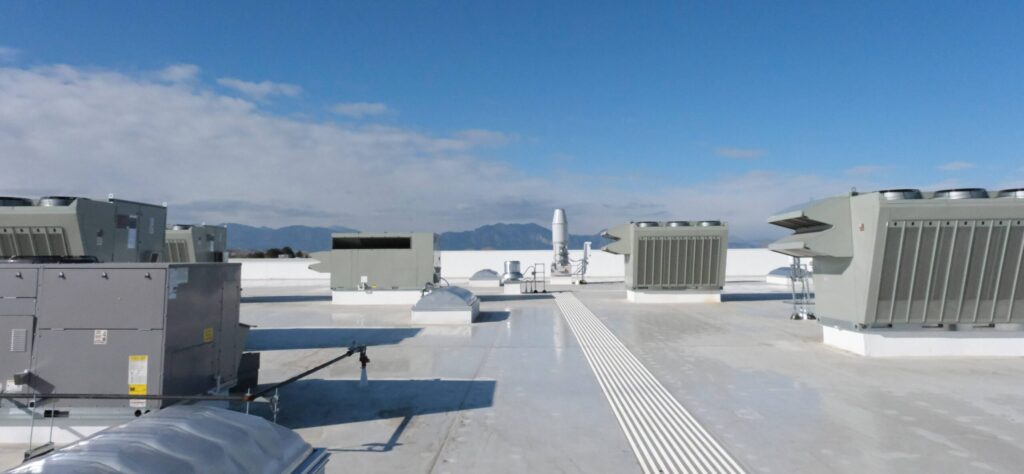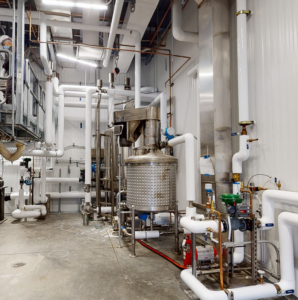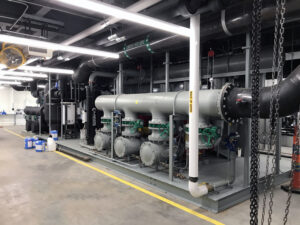At Murphy Company, we love working on projects that support our communities, help people, and present a complex, construction narrative. Charlotte’s Web was one of those special projects that fit that mold of what we look for in a project: a fast-paced schedule, large hydronic and steam utility systems, laboratory exhaust, extensive sanitary piping work, and a meaningful purpose.
The new, 140,000-square-foot, state-of-the-art CBD extraction facility is located in Louisville, CO. The facility features a 20,000-square-foot warehouse, 10,000-square-foot office, and 110,000-square-foot production space. Our sheet metal scope included thirty-five rooftop air handling units, twenty-eight rooftop exhaust fans, five high plume laboratory exhaust fans, multiple process stainless exhaust systems, full dust collection equipment, and ductwork scope, amongst a multitude of other miscellaneous air handling systems and associated ductwork. The piping scope featured a full central utility plant, including chilled water, process chilled water, heating water, steam, compressed air, and process gas system generation. The process piping scope included laboratory gas systems with 10 specialty gases and 5000 ft. of sanitary orbital welded stainless tubing.
This project had a wide variety of components and a critical deadline for completion which was aggressively set for November 1st, 2020, giving us only eight months for construction. The project was broken into five phases. Phases 1 and 2 of the project included moving the warehouse space and office to the new location. Phase 3 is where the work became critical, as the team was tasked with moving the previous manufacturing plant in Boulder to the new Louisville location. This “Pilot Area” was critical to the company as they were continuing to produce products while their production scale-up project was underway. This created challenges, especially given the need for chilled water, heating water, and compressed air requirements before building systems became operational. Phase 4 was the QC/R&D labs and Phase 5 was the installation of their extraction equipment. Coordinating these phases was the biggest challenge of the project and required constant communication between contractors, the architect/engineering team, and the owner.
On top of the already challenging project, we also had to monitor the CDC guidelines as COVID-19 was at its peak when construction started. Communication became key for this project not just for scheduling, maintaining budget, and keeping up with design changes, but also for safety. This is where we really utilize our in-house fabrication. Murphy Company’s focus on fabrication meant the team was able to spend 10,000+ hours in our fabrication shops limiting our risk exposure for labor overages, and safety incidents, while maximizing quality.
Being a design-build project for general contractor Gannett Fleming, it was crucial to gain the trust of the design team quickly. Murphy was able to do that by offering dynamic solutions to facilitate fabrication and pull labor hours from the jobsite to our shops. We fabricated 30% of this project, meaning that 30% of the construction hours took place in our fabrication facility. This minimized the work on site, and we were able to perform the work in a more controlled environment. This also helped, given the ever-changing design parameters associated with a new, startup, manufacturing process as well as in maintaining a safe site during the pandemic.
To accommodate our fabrication approach, we used our BIM team to help validate system design, materials, performance, and constructability with the extensive use of Trimble Total Station layout technology, greatly decreasing field layout crews and proving significant labor performance gains. Our fabrication approach was the biggest component when it came to how we tackled each phase. This resulted in lower construction costs, shorter schedules, improved maintenance functionality, and fewer trade coordination change orders.
With the use of BIM, our team was able to effectively explore and manipulate the various elements of design and construction. This helped us make critical decisions on space, materials, and systems. Each stage of design and construction produced significant benefits from the utilization of BIM, helping to solidify the trust between Murphy and Gannett Fleming. We were able to fully model the 140,000 sq. ft. building using BIM which assisted us in timing and planning for the next phases within the project timeline.
The number one safety concern with any staged, owner-occupied project is ensuring the end user’s team and the construction team are aware of one another and are able to keep each other safe. Constant communication, including daily foremen huddles, allowed the construction team to communicate to the customer where critical activities were taking place, and where PPE was needed during ever-changing construction zones. It also benefitted the team in ensuring the customer had all utilities required as they began to utilize their new space.
With the COVID-19 virus being at its peak, we had to be extra cautious toward COVID transmission and craft safety. Safety audits conducted weekly on site by the foremen and the project team. The foremen focused on their respective areas while the project team performed a site-wide audit. In addition to our rigorous safety procedure, we required all employees on site to wear masks and try to maximize social distancing. We provided sanitation stations around the job site to make sure we were taking care of all the employees. We had no COVID-19 outbreaks on this project and ZERO recordables.
Given the customer’s ever-changing industry, their goals for the project were to construct a scalable, versatile, and efficient facility with a focus on reaching more people who need their products. The consolidation of warehouse, production, and office space allowed Charlotte’s Web to not only produce more product but reduce cost for the end user. This consolidation effort is far from the only facility upgrade to achieve their goals. The scaled-up infrastructure of their extraction processes, quality control labs, and research and development space allow for further product development to continue to improve people’s quality of life. According to the owner, “In the midst of a socially challenging year and an ever-changing industry, Murphy provided Charlotte’s Web with flexible, reliable, and highly personalized mechanical services and infrastructure. Murphy has been a critical partner to Charlotte’s Web and our ability to maintain the high-quality standards our brand is built on.”
The Charlotte’s Web Louisville New Manufacturing, Office, and Lab Facility project was the culmination of seven brothers’ success at treating a young child in unbearable pain. Charlotte Figi was diagnosed with Dravet’s Syndrome at the age of 3 and was suffering from hundreds of seizures weekly. After all clinical prescription options had been exhausted, Charlotte’s parents decided to try an alternative approach, medicinal CBD. Cannabidiol (CBD) is extracted from industrial hemp and contains little to no tetrahydrocannabinol (THC), meaning that it offers all the medicinal benefits of hemp without any of the psychoactive effects. To Charlotte’s parents’ pleasure, she immediately decreased her weekly seizures to zero. Because of this success story the Stanley Brothers changed their name to Charlotte’s Web and there are now many fortunate children, like Charlotte, who are able to live healthier and happier lives. We are proud to have made this vision a reality for the Stanley Brothers, the late Charlotte Figi, and our community.




